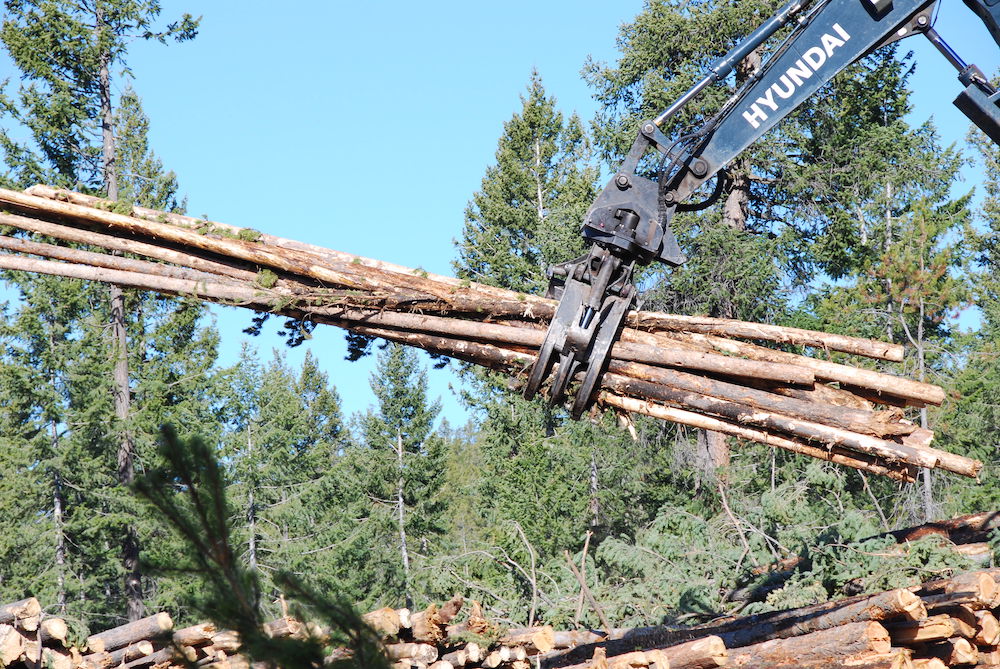
Industry News
News
Opinions
Editorial: Is wood products business over in BC?
Major forestry players are turning away from Canada’s western province and investing in Eastern Canada, the U.S. and Europe.
February 4, 2022 By Maria Church
 Logs in the B.C. Interior. Photo: Annex Business Media.
Logs in the B.C. Interior. Photo: Annex Business Media. Last November will be a month the B.C. forest industry remembers for many years, if not decades.
The month began with a bombshell announcement from the B.C. government, halting logging in 2.6 million hectares of old-growth forests. Shortly after, the province announced a swath of policy changes to the forest tenure system aimed at reducing timber harvesting rights for the major players and redistributing them to First Nations and smaller companies.
The so-called atmospheric river hit B.C.’s lower mainland and wreaked havoc in mid-November. Transportation disruptions from damaged infrastructure idled many lumber and value-added manufacturers.
And, in late November, the U.S. dealt a final crushing blow, doubling the tariffs on Canadian softwood lumber shipments. The Independent Wood Processors Association of British Columbia described the news as hammering more nails into B.C.’s value-added coffin.
The writing may have been on the wall for some of these nails, evidenced by the long-term trend of B.C.’s larger lumber producers diversifying their assets with U.S. and even European acquisitions.
Not surprisingly, the acquisitions seem to be coming at a rapid pace these days.
Interfor’s diversification plans most recently zeroed in on Eastern Canada. The company announced plans in mid-November to purchase 100 per cent of the equity interests in EACOM. The acquisition includes seven sawmills, an I-Joist plant, and a reman plant in Ontario and Quebec. With EACOM in the mix, just 18 per cent of Interfor’s total lumber capacity is in B.C.
West Fraser, currently the world’s largest lumber producer, recently added a turn-key sawmill in Lufkin, Texas, to their portfolio. The new mill bumped their U.S. lumber capacity up to 50 per cent of the company’s total. West Fraser’s executives say the acquisition is just another step in their U.S. expansion plans. (Read about West Fraser’s acquisition of Angelina Forest Products, and see inside the mill here.)
And Canfor made news in December with its $420-million deal to buy Millar Western Forest Products’ solid wood operations and tenure in Alberta, adding 630 million board feet of lumber capacity and a nearly half a million-hectare forest management agreement area.
We’re applauding Interfor, West Fraser and Canfor, all Canadian corporate success stories, but we are also wincing as we watch investments dwindle in Beautiful British Columbia.
Many industry experts blame the unfriendly business environment in B.C. At the Truck Loggers Association’s virtual convention in mid-January, experts expressed frustration and concern for the future of forestry in the province. (Read our takeaways from the convention.) Despite a positive outlook for the North American lumber market, B.C. is not in a position to take advantage of strong U.S. lumber demand.
Don Wright, former deputy minister to B.C. Premier John Horgan and now a senior fellow at the Public Policy Forum, suggested the forest policy changes in B.C. are because the industry lost its social license. “It has not effectively made the case that it is essential to B.C. prosperity,” he said.
It’s an interesting point. For years now, my conversations with operators and forestry executives alike include concerns that forestry has a PR issue. I’ve reflected on it on editorials past, and no doubt will again.
At this point, with the ink dry on Bills 23 and 28, we can only hope that B.C.’s politicians are making these sweeping policy decisions with a clear, actionable, long-term plan in place to revitalize the forest sector and bring back investment.
Their stated goals are commendable and, in some cases, overdue: protecting caribou habitat and old-growth stands, addressing declining timber supply, and increasing First Nations’ participation in forestry. But whether their decisions will lead to these outcomes remains to be seen.
What we do know is that there will be casualties, likely many.
Is forestry business over in B.C.? That’s certainly too strong a statement and it’s overlooking the many smaller lumber producers and value-added manufacturers who still call B.C. home and will continue to fight for their right to operate under this new forestry regime.
But is business leaving B.C.? Absolutely. And will it come back to the forest-flush province? Time will tell.
Print this page